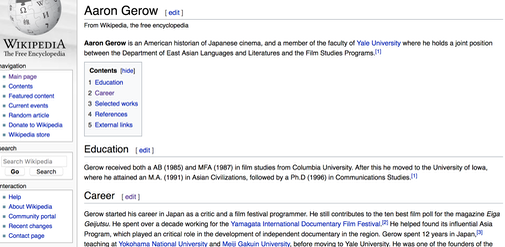I noticed this a few weeks ago, but it seems there is now an article about me on the English language Wikipedia. Here is the original and here is a screenshot:

Having dabbled a bit on Wikipedia, I know there are notability standards for whether some person (or thing) gets an article, so I feel a bit honored that someone thought me notable enough. (No, I did not write it myself!) Looking at the history, I can see there was actually a bit of a squabble over notability when it first appeared, but that seems to have settled down. (You never know, though, whether someone will still not nominate it for deletion.) I also see that someone first created it a couple of years ago and it languished in the Draft space on Wikipedia for a long time, so it was clearly not a shoo-in on the encyclopedia.
As with anything written about me, I am somewhat embarrassed about the whole thing and don’t really want to read it. But it does seem they get a few things wrong. I don’t still contribute to the Eigei Best Ten and I long ago ceased writing reviews for the Daily Yomiuri (which no longer exists, by the way, at least under that name). Yet it does seem someone does know my work enough to offer a decent description of Visions of Japanese Modernity.
I know enough about Wikipedia to know that I should not be creating or contributing to an article about myself. For me it’s not just the rules: I’ve seen people do that and I find it quite distasteful. So I have not even tried to correct the errors that currently exist. (I believe I can ask for corrections on the article's talk page, but even that I find embarrassing.)
Beyond the embarrassment, I do have some ambivalent feelings about Wikipedia. Wikipedia is still user-generated (on Wikipedia, Wikipedia is not considered a reliable source), so there is a lot of stuff that shouldn’t be there (including, perhaps, me), as well as a lot of things that should, but aren’t. Anyone can edit it, so there are errors throughout Wikipedia far more egregious than the ones on my page. I believe there was some study that showed that Wikipedia can be quite accurate, but I think that is only for pages on popular topics that are in effect checked by hundreds of users. I know that articles on more obscure topics, like Japanese film and media, don’t get those hundreds of eyes and thus are rife with errors. The English Wikipedia also suffers from major biases, as it leans American and Eurocentric. It suffers from recentism and relies too much on online sources. Many have cited gender biases. Specific fields are shaped by current trends and popularity, so there seem to be articles on every anime seiyu in Japan, but few on the major film people before WWII.
It was partly those errors and biases that prompted me to start making some edits on Wikipedia. I think Wikipedia is the fifth most popular website in the world, so many people will keep on viewing these errors unless someone corrects them. I’d rather people get the right information than make some stance and be snobbish about Wikipedia. The page Cinema of Japan seems to get about 5000 views every two weeks, which is many many more views than Tangemania gets. It is quite a mess, however, and I definitely don’t have the time to put it into shape. I can’t tell my students to do it because they have their own research and no one will get tenure for editing Wikipedia. But I do believe that if we are dedicated to educating the public about Japanese film and media, all of us could spend a little time every now and then helping improve what is, for better or for worse, one of the major repositories of knowledge on the planet.
Again, one could say students should read real encyclopedias and not Wikipedia. I say that, but I have contributed to enough encyclopedias to know they are not perfect either. All of us need to learn more about finding and using sources, especially in an age where fake news has become a political tool—and charging everything you don’t like of being fake news an even worse political tool.
But at a time when many are calling for open access to academic journals, Wikipedia serves as one model for an open access, fully public knowledge repository. I have participated in discussions with fellow scholars about whether to start our own Japanese film wiki. Such discussions should continue, but they face the reality that young academics won’t get credit for that work and enormous dedication is needed to create and maintain such a wiki. Wikis are very much social organisms that require modes of maintenance and reproduction.
That has been one of the more interesting aspects I’ve seen participating in Wikipedia. For all intents and purposes, it is an anarchistic social organization with no leaders, except the administrators who are selected from users by users. I am not wholly trustful of the Wikimedia Foundation, but Wikipedia is ostensibly non-capitalistic. Everything is supposed to operate by horizontal consensus, from creating new rules to deciding whether to delete a page. As with any supposedly democratic organization, the reality does not always match the ideal. Consensus sometimes means only three votes in a deletion discussion out of over 100,000 active users. While civility is fairly well enforced, there are still plenty of obnoxious and unreasonable users, including not a few with biases and prejudices (such as against popular culture or pornography). Wikipedia can be an interesting test case for some kinds of online communities. It’s thus interesting to think about how such communities continue.
So while I will not contribute to my own page on Wikipedia, I still will dabble in it every now and then.

